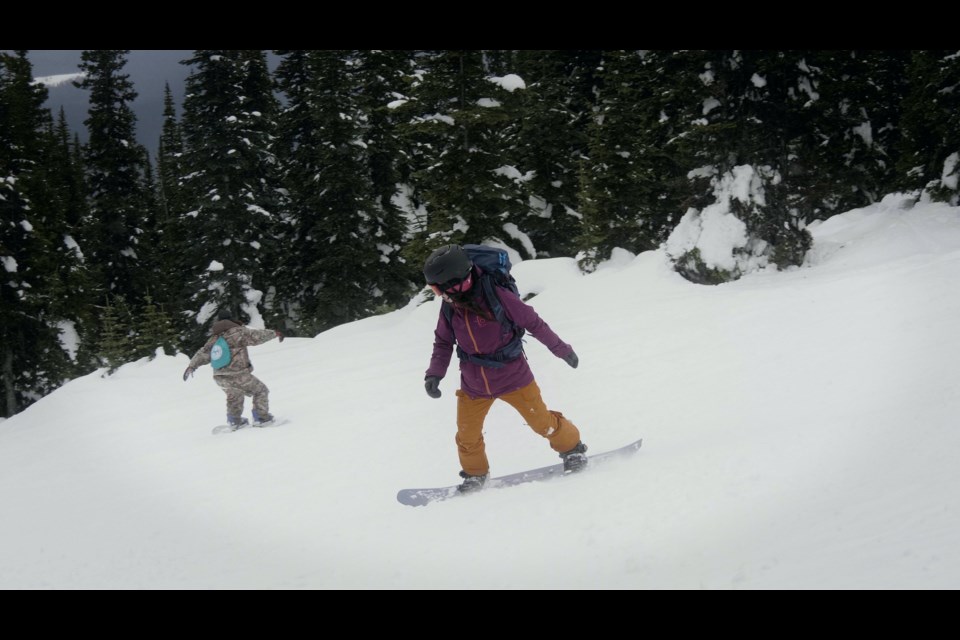It is a simple and yet jarring fact that comes through in Ross James Reid’s short film that is set to have its world premiere in the upcoming Snowsports 2 Show at the Vancouver International Mountain Film Festival’s Fall Series.
The series streams online from Nov. 12 to Dec. 12; in-person screenings are on from Nov. 12 to 20 at four venues in Vancouver. Riding Red’s in-person show is on Nov. 20 at the Rio Theatre in Vancouver.
Snowsports Show 2 is presented by Arc’teryx.
The 16-minute film looks at the benefits of — and stories behind — the Whistler-based Indigenous Life Sport Academy (Formerly the First Nations Snowboard Team). The film was produced by Reid and the academy's Chelsie McCutcheon and Court Larabee.
Led by Indigenous leaders, youth are given the opportunity to participate in sports such as snowboarding, skateboarding, biking, climbing, hiking, and golf.
“Skiing, in particular, is a very privileged, wealthy, white person’s sport that takes place all over Turtle Island on these stolen Indigenous lands,” said Ross, the film’s director and a Squamish resident. “So creating those connections with these people who have been here since time immemorial, and allow them to have that access to their land in a new way and in a way that continues to build and uplift their spirits and unite the community in a new way.”
Ross said that there have long been programs that get urban kids out on the mountains, but not so much for more rural youth who face barriers accessing some of these sports in their own backyards.
In the film, the academy’s McCutcheon, who is a member of the Wet’suwet’en Nation, returns to her home community of Witset, which is about 45 minutes away from the ski hill in Smithers, to run a Mountain Mentorship on the mountain for Wet’suwet’en youth.
There are many barriers to Witset youth accessing the hill, including the cost and a lack of transportation.
Witset is along the infamous Highway of Tears along where many Indigenous women and girls have been abducted or found murdered. Many of the cases remain unsolved.
“There are so many barriers to entry, so to be able to break those down and allow these kids to have like a positive outlet is a really positive thing,” said Ross, who travelled to Witset in March for the filming.
He said that while as a settler from the U.S. who had worked to educate himself on issues faced by First Nations in Canada, he said throughout making this film, he was surprised at the levels of trauma many deal with.
“It was incredibly eye-opening to see first hand the level of traumas that occur in these communities from all over,” he said.
Ross said there is much settler culture could learn from the relationship Indigenous communities have with the land.
“As a settler here, you go out onto these lands, and it has a very colonial mantra to it. You are going out, and you are ‘exploring;’ you are ‘discovering’ and you are finding ‘adventure,’” he said.
“There’s such a richer, deeper connection to the land that as settlers, we don’t have and will never have. There is an element of respect and stewardship that automatically comes with engagement with the outdoors that we don’t have with our western society...
“It has always been much more a relationship of reciprocity and connection and honour and respect that we just don’t have. I think all of our communities, whether it is Indigenous or settler or a mix of these — all of these communities can benefit so much by having a connection to this that honours the longevity of human relations on this land.”
For McCutcheon, access to snow sports didn’t come easily.
“My parents were teen parents who wished to have social change within my lifetime, recognizing that there was.... a need for the bridging of Indigenous and non-Indigenous communities as a lot of the experience was very segregated,” she said. “My parents accessed skiing as an avenue for me as a young girl to connect to something that was so different than what our community at that time could dream of,” she said. “It created a relationship and community in the mountains, and my parents weren’t financially in a position to support that so they called on the community to fundraise year-round for me to access skiing, which led to me being on the ski team and eventually to me becoming a snowboarder, to an instructor, and I have been in the industry for over 21 years.”
The community supported her and now she is giving back.
That is why the Indigenous Life Sports Academy and the associated Indigenous Women Outdoors are available now as a part of a movement for accessibility and to address any barriers, including social barriers, to offer these types of opportunities to others, she added.
McCutcheon has made it her mission with the academy — as has Larabee, founder of the academy, and Myia Antone, director of hiking programs — to be agents of social change, she said.
“It is a big job,” she said, acknowledging that being the face of the movement sometimes means speaking and showing up when grieving or processing her own trauma.
“I don’t have the luxury to sit down and grieve, and so I think that is a big difference of working with Indigenous people and being an Indigenous woman myself as a part of the community is that when we are put in these positions, we also have to do it even when we are grieving,” she said.
The team spearheading the academy are leading the way in their sports and hoping that others will follow.
“We understand that in order to create this level of movement, that there needs to be a momentum, and it has to be quite profound," she said.




